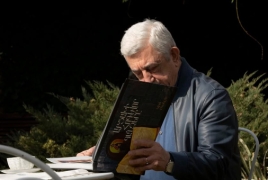
The Artsakh Movement began on February 20, 1988, when the people of Artsakh raised their voices in defense of their rights and freedoms, gaining the full support of the Armenian nation.
In February 1988, following all legal norms and democratic principles, the Armenian population of Nagorno-Karabakh demanded reunification with Armenia. On February 20, 1988, during an extraordinary session in Stepanakert, the Nagorno-Karabakh Autonomous Region Council of People's Deputies adopted a resolution, appealing to both Yerevan and Baku to remove the region from the Azerbaijani SSR and unite it with the Armenian SSR.
By February 26, the formation of the "Karabakh" Committee was announced. In April, the committee underwent changes, and on May 19, Igor Muradyan was removed for calling for armed struggle during a rally. The newly formed "Karabakh" Committee consisted of 11 members: Levon Ter-Petrosyan, Babken Ararktsyan, Vano Siradeghyan, Vazgen Manukyan, Hambardzum Galstyan, Samvel Gevorgyan, Rafael Ghazaryan, Samson Ghazaryan, Aleksan Hakobyan, Ashot Manucharyan, and Davit Vardanyan.
However, every step taken toward democratic self-determination and a peaceful resolution was met with waves of violence against the Armenian population, widespread violations of Armenian rights, demographic expansion, economic blockades, and more. Pogroms and mass killings of Armenians began in Azerbaijani cities such as Sumgait, Baku, Kirovabad, and Shamkhor, resulting in hundreds of deaths and injuries. Around 450,000 Armenian residents of Azerbaijani cities and villages became refugees.
On the occasion of Artsakh's Renaissance Day and the 37th anniversary of the Artsakh Movement, Armenia's third President Serzh Sargsyan issued a statement, emphasizing that memory is our strength, our guiding principle for moving forward, and our will to act.
He declared: “We remember the national-liberation struggle of Artsakh and those who squandered its victories and betrayed the nation.”
"Memory is our strength"
▪️ To withstand looming dangers,
▪️ To heal from losses,
▪️ To avoid past mistakes,
▪️ To reassess the present,
▪️ To honor past victories and heroes,
▪️ To fight for the fundamental right to live with dignity in our homeland—free and independent.
"Memory is our guide forward"
▪️ We remember the Artsakh Movement that began 37 years ago and culminated in a victorious national-liberation struggle.
▪️ We remember those who squandered these victories and betrayed the nation.
"Memory is our will to act"
▪️ To categorically reject the ideology of Armenia’s current leaders, which seeks to erase our roots, history, homeland, and national dignity.
▪️ To refuse fabricated and dangerous narratives about the state and homeland.
▪️ To cast off indifference.
▪️ To overcome fear.
▪️ To remain vigilant.
▪️ To carefully assess risks.
▪️ To achieve victory once again.
"A nation that loses its memory will inevitably lose its future as well. We remember," reads the statement by Armenia's third President.

